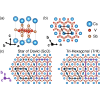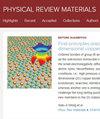CsV3Sb5 中跨长度尺度的相分离电荷秩序和孪晶
IF 3.4
3区 材料科学
Q2 MATERIALS SCIENCE, MULTIDISCIPLINARY
引用次数: 0
摘要
我们介绍了 X 射线散射研究,该研究解析了可果美超导体 CsV3Sb5 的电荷密度波(CDW)态中的结构孪晶和相分离。据报道,CsV3Sb5 中的三维 CDW 态在其卡戈米平面内形成了复杂的大卫之星(SoD)或三六角形(TrH)畸变图案的叠加,但平面外的堆叠具有易变性。为了解决这种蜕变性的影响,我们利用温度相关的高动态范围绘图(HDRM)和暗视野 X 射线显微镜(DFXM),展示了在多个长度尺度上收集的 CsV3Sb5 的倒易空间绘图和实空间图像。实验数据为在 CDW 状态下形成丰富的微观结构提供了证据。数据证明了 2×2×4 和 2×2×2 CDW 超胞的形成依赖于热历史和机械变形的可转移性。我们进一步直接解析了这两种超胞的实空间相分离,以及由 CDW 状态的断裂旋转对称性驱动的实空间结构孪生。我们的综合结果为探测 CsV3Sb5 电子特性的实验中微观结构和孪晶的作用提供了见解,在 CsV3Sb5 中,旋转对称性被三维电荷密度波序打破,但对于任何单个 kagome 层来说,旋转对称性都是局部保留的。本文章由计算机程序翻译,如有差异,请以英文原文为准。

Phase-separated charge order and twinning across length scales in CsV3Sb5
We present x-ray scattering studies resolving structural twinning and phase separation in the charge density wave (CDW) state of the kagome superconductor . The three-dimensional CDW state in is reported to form a complex superposition of Star of David (SoD) or Tri-Hexagonal (TrH) patterns of distortion within its kagome planes, but the out-of-plane stacking is marked by metastability. To resolve the impact of this metastability, we present reciprocal space mapping and real-space images of collected across multiple length scales using temperature-dependent high-dynamic range mapping (HDRM) and dark-field x-ray microscopy (DFXM). The experimental data provide evidence for a rich microstructure that forms in the CDW state. Data evidence metastability in the formation of and CDW supercells dependent on thermal history and mechanical deformation. We further directly resolve the real space phase segregation of both supercells, as well as a real-space, structural twinning driven by the broken rotational symmetry of the CDW state. Our combined results provide insights into the role of microstructure and twinning in experiments probing the electronic properties of where rotational symmetry is broken by the three-dimensional charge density wave order but locally preserved for any single kagome layer.
求助全文
通过发布文献求助,成功后即可免费获取论文全文。
去求助
来源期刊

Physical Review Materials
Physics and Astronomy-Physics and Astronomy (miscellaneous)
CiteScore
5.80
自引率
5.90%
发文量
611
期刊介绍:
Physical Review Materials is a new broad-scope international journal for the multidisciplinary community engaged in research on materials. It is intended to fill a gap in the family of existing Physical Review journals that publish materials research. This field has grown rapidly in recent years and is increasingly being carried out in a way that transcends conventional subject boundaries. The journal was created to provide a common publication and reference source to the expanding community of physicists, materials scientists, chemists, engineers, and researchers in related disciplines that carry out high-quality original research in materials. It will share the same commitment to the high quality expected of all APS publications.
 求助内容:
求助内容: 应助结果提醒方式:
应助结果提醒方式:


